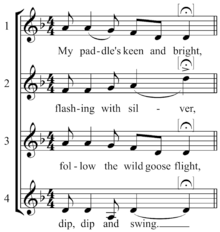Land of the Silver Birch
"Land of the Silver Birch" is a traditional Canadian folk song that dates from the 1920s. The lyrics are sometimes erroneously attributed to Pauline Johnson, perhaps in confusion with her well-known poem, "The Song My Paddle Sings".[1] It is sometimes sung to keep time while canoeing, and sometimes sung at campfires in a round. It is in Aeolian, or natural minor, but some have performed it with a raised sixth, creating a Dorian feel.
Its subject matter is a romanticized vision of nature and the land from the perspective of an Indigenous person, but it remains popular with the non-Aboriginal majority in Canada. Bonnie Dobson sang this song on her 1972 self-titled album. This song appears in the Paul Gross film Men with Brooms (2002). In 2005, the song was partly re-written by Canadian folk singer Dickson Reid and released on his debut album, Sugar in the Snow. It's also a popular song sung in many elementary schools.
Lyrics
Like most traditional songs the lyrics vary slightly. The following are representative:
verse 1:
- Land of the silver birch
Home of the beaver
Where still the mighty moose
Wanders at will
- Refrain:
Blue lake and rocky shore
I will return once more
boomdidi boom boom – boomdidi boom boom – boomdidi boom boom boom
- High on a rocky ledge
I'll build my wigwam (Alternate version: There where the blue lake lies, I'll set my wigwam)[2]
Close to the water's edge
Silent and still
- Refrain
- My heart grows sick for thee
Here in the low lands
I will return to thee
Hills of the north
- Refrain

It is related to a similar song "My Paddle's Keen and Bright" (![]()
- My paddle's keen and bright
Flashing with silver
Follow the wild goose flight (some people learn another colloquial version: Follow the pale moonlight)
Dip, dip and swing
- Dip, dip and swing her back
Flashing with silver
Swift as the wild goose flies
Dip, dip and swing
Alternative lyrics
The lyrics of this song can be quite different depending on who you talk to and what region of Canada they are from. Some possible variations and additional verses:
- Deep in the forest
Down in the lowlands
My heart cries out for thee
Hills of the North
- Swift as a silver fish
Canoe of birch bark
Thy mighty waterways
Carry me forth
- Though I am forced to flee
Far from my homeland
I will return to thee
Hills of the North[4]
- High as an eagle soars
Over the mountains
My spirit rises up
Free as a bird[5]
A French version, "Terre du bouleau blanc", was distributed by Orff Canada.[6]
"Silver Birch" in the Scouts and Guiding movement
Since the 1930s, the song has been popular with Scouts and Girl Guides. Its origin is unclear. It is sung regularly at Canadian Scout and Girl Guide Camps, including Doe Lake, Camp Maple Leaf, Camp Wenonah (co-educational camp) and Camp Wa-Thik-Ane in Quebec's lower laurentians.
The song is also sometimes sung at Boy Scout Camps in the United States, though sometimes "eagle" is sung in place of "beaver". Another variation is sung at the opening and closing campfires at Ma-Ka-Ja-Wan Scout Reservation in Pearson, Wisconsin.[7] Cuyuna Scout Camp of Crosslake, Minnesota uses this song as one of the three it uses to close its Sunday and Friday night campfire programs, [8] as does Camp Babcock-Hovey in Ovid, New York.
The translated Italian version "Terra di Betulla" is likely frequent campfire song for Italian scouts.
Other Uses
This song is performed by children in American elementary school plays about the First Thanksgiving to typify Native American lifestyle only using the first verses.
Criticism
In 2017, school administrators at the High Park Alternative Public School in Toronto, Ontario characterized the song as racist. In a letter to parents they said, "While its lyrics are not overtly racist ... the historical context of the song is racist." Other experts disagreed with this assertion and the music teacher who had the song performed at a school concert sued the administration for defamation.[9] However, it appears these experts were commenting on the assertions as they relate to the use of Johnson's work—because it is not known that the song was, indeed, written by Johnson, these criticisms need to be considered in this context.[9]
Notes
- Carole Gerson and Veronica Strong-Boag, eds. E. Pauline Johnson, Tekahionwake: Collected Poems and Selected Prose. University of Toronto Press, 2002
- A scout's campfire songbook (PDF). p. 7. Retrieved 26 October 2017.
- Read MacDonald, Margaret; Winifred Jaeger. The Round Book: Rounds Kids Love to Sing. North Haven, Conn: Shoe String Press Inc., 1999, Page 14. ISBN 978-0-87483-786-5. Accessed 20 August 2011.
- Girl Scouts of the USA, 1960s
- Scouts Canada. "Land of the Silver Birch". Scouts Canada Wiki. Scouts Canada. Retrieved 6 November 2014.
- Louise Morand. "Boîte à idées: Interpréter pour mieux comprendre" (PDF) (in French). Orff Canada.
- Confirmed by staff who viewed this page
- "Camp Cuyuna 2010 scout vespers & taps". Retrieved 15 June 2020.
- Cruickshank, Ainslie (7 December 2017). "Toronto music teacher sues after principal, VP call folk song racist". Toronto Star.